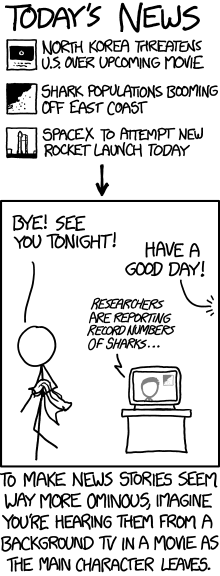
XKCD: Clumsy foreshadowing
We're both from an age in which (in cinema) the only time people casually throw aside a lit cigarette, is where it will end in a fire. We've had hack foreshadowing shoved into us by hack scriptwriters to such a degree that we pick up clues automatically, and never have these reactions challenged.
Now, not being a literature student, I heard about foreshadowing maybe only a few years ago. A lot of it comes more under the 'Chekhov' section of tv tropes, eg checkov's gun; a gun above the mantle piece in the opening scene must be fired before the conclusion (whereas foreshadowing proper might more thematic idea). As a scriptwriting tool, it's an invaluable way of thematically tieing up your story, and making it appear to be well-planned. Indeed, one of the reasons I love 'cabin in the woods' so much is because everything is set up and payed off. It's sutch a thoroughly written piece.
But at the other extreme, you've got things like the tedious opening of One Day, where a woman riding a bike is definitely going to get killed, because nobody rides a bike in a film unless they're going to be knocked over. That's not just One Day's fault, but they play it straight and knock her down, as predicted. By the time this came up in the supercut of 'people stepping into the street and getting knocked down', I was laughing out loud at it (and only half way through). The clip is at 5.54.
So back to Barbara Streisand - what purpose did the thrown away cigarette serve? Well as Freud said, "sometimes a cigar is just a cigar." In this case, it's just pure character. The only purpose of it is because in that style of filmmaking, not every single bloody thing had to have a consequence. Sometimes, it's just someone's character coming through, and that's enough.
People never bump into a person in the street, or have to repeat what they said because they talked with their mouth full, or get spam calls in these stories (I remember an episode of Seinfeld with a spam call as a throw away joke; it didn't further the plot along, it was just for character and a giggle). It's the same problem with how in virtually any film, if a woman and a man meet, they're going to fall in love, because they have to. You can't just have two attractive members of opposite sexes near each other without love happening, cinema tells us. This is just automatic.
And that's why many films resort to that kind of lazy call-forward-and-back; they're filling in the gaps that should be filled with well-rounded characters. They're trying to build a plot around consequences of actions, without having to create characters that think for themselves. The actions are accidental; the plot is developed by coincidences and conveniences rather than decisions.
(Someone will argue 'what about the coen bros? But their characters do make decisions; it's just that they're decisions don't impact the plot at all, or do so on an unpredictable way, and that's usually the point)
I don't think I'm arguing for Dogme realism, just that characters should be allowed more time to breathe and come to life. I suppose it's a delicate balance, because put not enough pointlessness in a story and you've lost the sense of characters, put too much pointlessness and it looks like you've dropped threads all over the place.
Think about truly character driven works, especially comedies, and they're full of pointless moments that only exist to expose characters. I know i oscillate, and sometimes think that stories are all about ideas, but right now I really respect authors, and actors, who are deep in character.
No comments:
Post a Comment